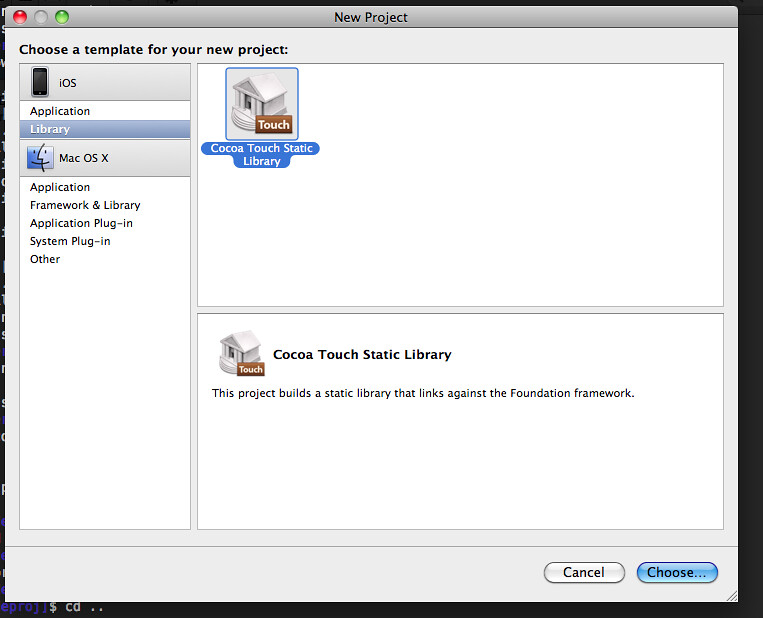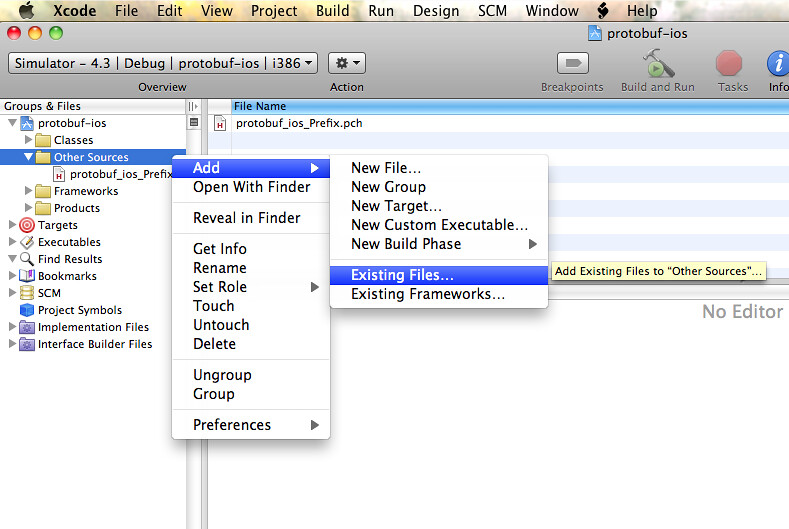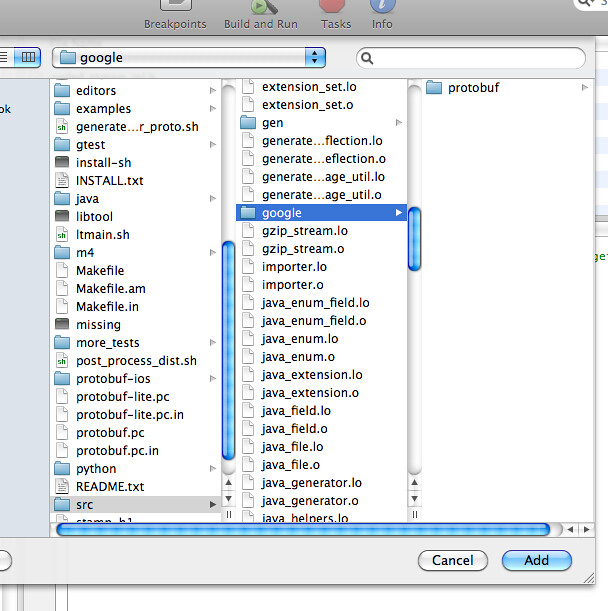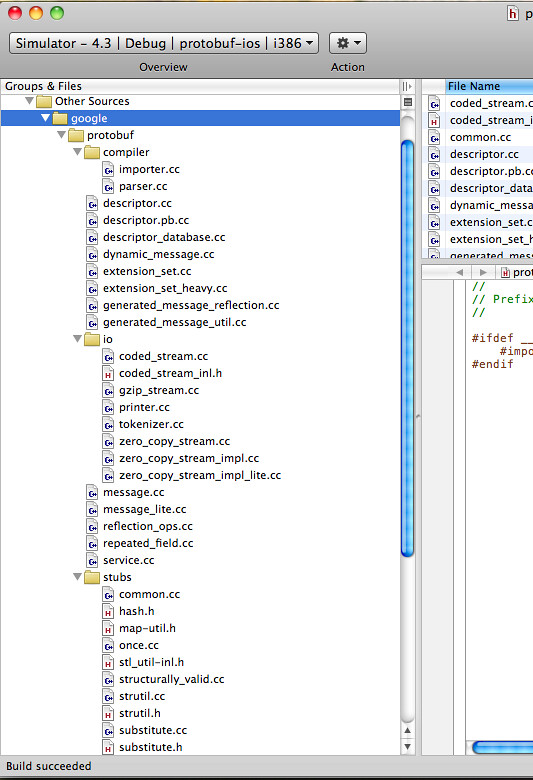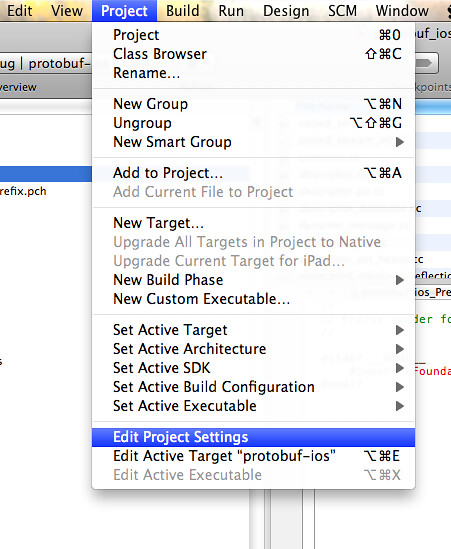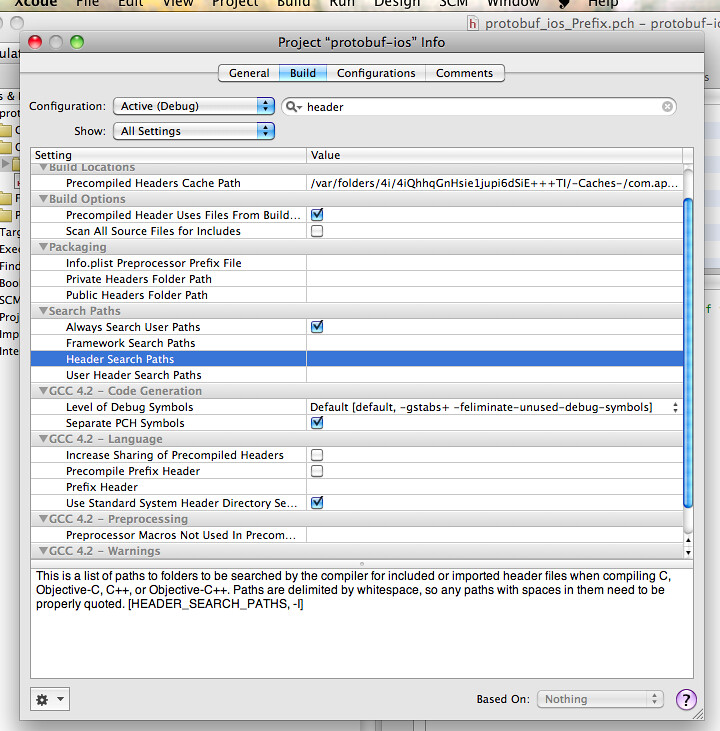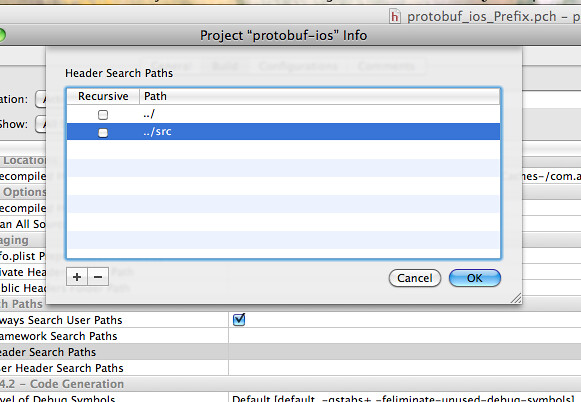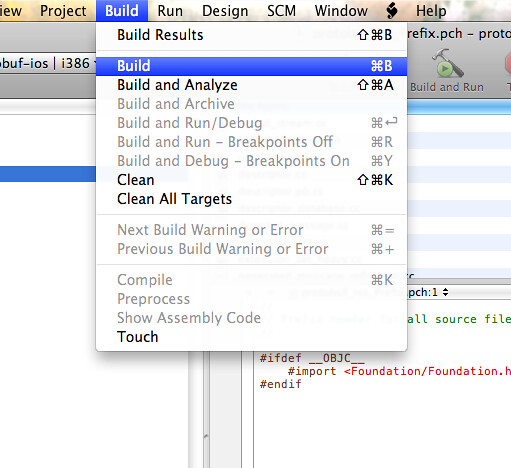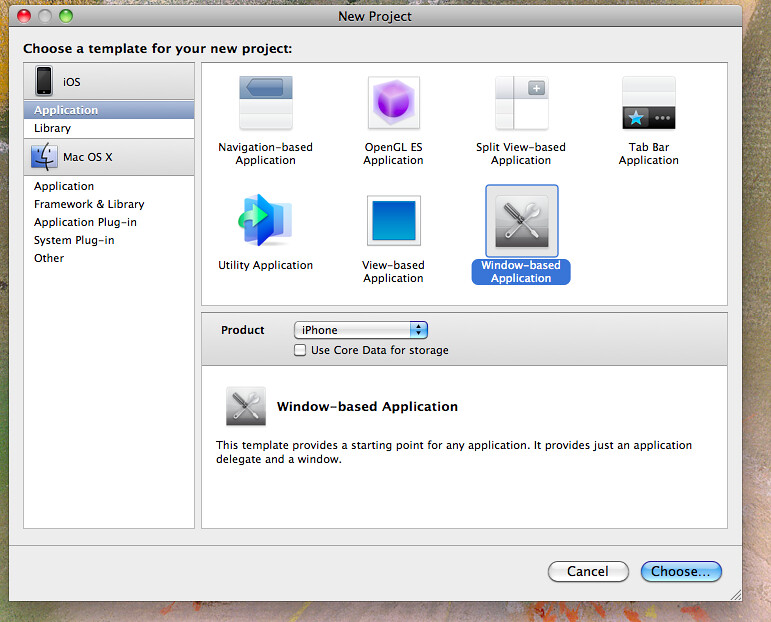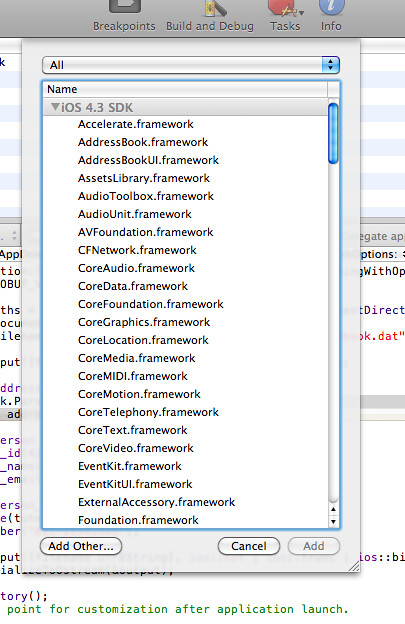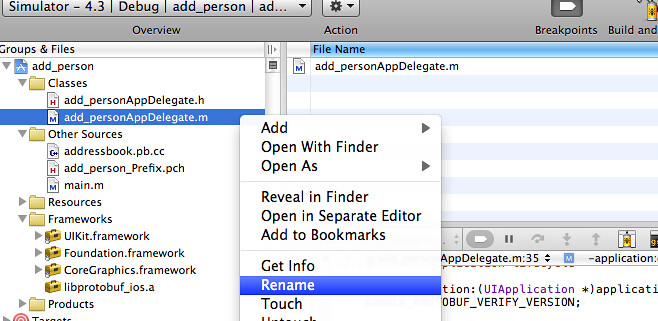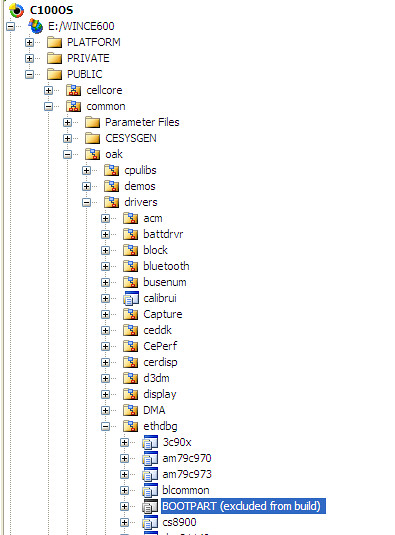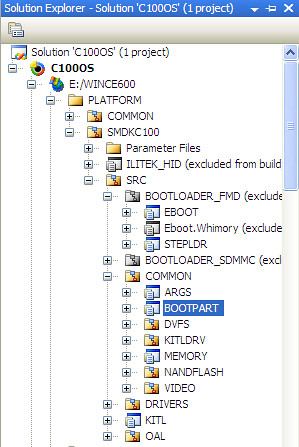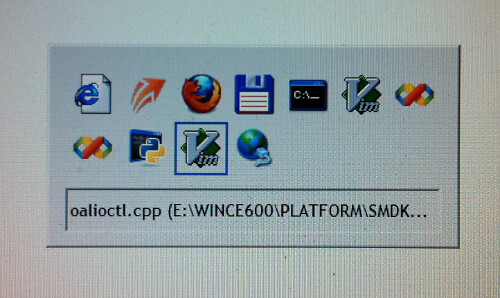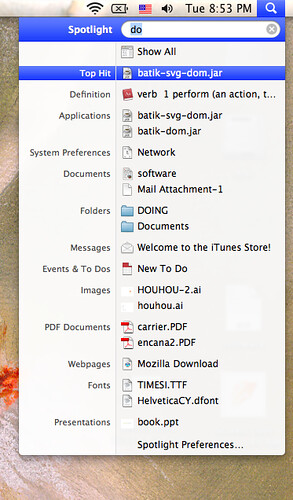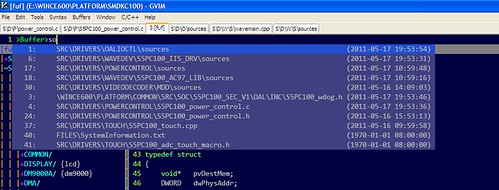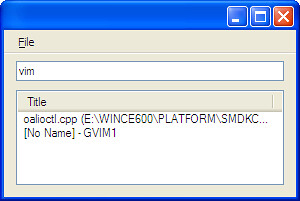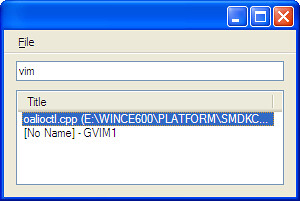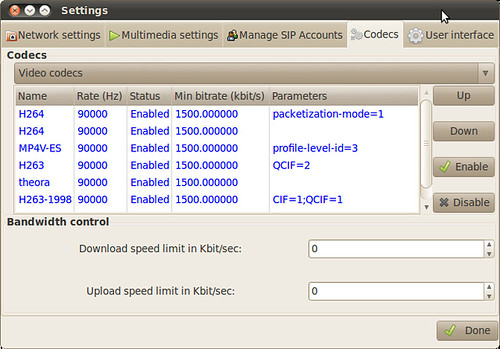While designing BSP, it's very common to enable or disable some features based on our requirements. Subsequently, we may need to change our code according to the feature's availability.
On a wince system, the status of a feature's availability is controlled via batch files, either cesysgen.bat (controls standard ce modules and functions) or {platform_name}.bat (controls platform specific settings). The status of a feature is set through environment variable in the batch file. The build system will build the image according to environment variables. For instance, the following line in a batch file instruct not to support SDMMC boot.
set BSP_NOSDMMC_BOOT=1
It may be desired to change our code based on the aforementioned setting. But the problem is the compiler (to be specific, preprocessor) can't see the value of BSP_NOSDMMC_BOOT environment variable. So, in order to pass the value to compiler, we need the help of build system. Just like gnu make, the wince build system can see the environment variable and define a macro for the compiler.
The code snippet below is extracted from a sources file, and shows how to define macro according to the BSP_NOSDMMC_BOOT's value.
!IF "$(BSP_NOSDMMC_BOOT)"=="0"
CDEFINES = $(CDEFINES) -DBSP_NOSDMMC_BOOT
!ENDIF
Then, in our code, we can use the BSP_NOSDMMC_BOOT macro to do conditional compilation.
And if we want to disable the whole module based on the environment variable's value, we can define SKIPBUILD in sources file, like this:
!if "$(BSP_NOSDMMC_BOOT)"=="1"
SKIPBUILD = 1
!endif
Monday, December 5, 2011
Tuesday, November 29, 2011
use protobuf on iphone app
This post is a step by step tutorial showing how to use protobuf in iphone application. It shows how to:
2. Start XCode and create a new project. Select iOS - Library - Cocoa Touch Static Library project template.
3. Right click Other Sources and select add Existing Files.
4. Select the src/google directory, and add the directory recursively.
5. In the previous step, we add too much source files than actually needed. The sources files for the protoc compiler and unittest are included too. They're not needed to run ios application. To filter out unnecessary files, we can refer to the libprotobuf_lite_la_SOURCES and libprotobuf_la_SOURCES variables in src/Makefile, which list source files needed for protobuf library.
6. Now we need to add header file search path. Click Edit Project Settings under Project menu item.
7. Double click Header Search Paths.
8. Add protobuf and protobuf/src directory.
9. Now build the project.
10. In the terminal, run "make install" command to build protoc compiler and install it to default location(/usr/local/bin/protoc).
11. Go to examples directory and run "protoc addressbook.proto --cpp_out=./" to generate addressbook.pb.cc and addressbook.pb.h files.
12. Create a Window-Based Application.
13. Add reference to the static library we built. Right click Frameworks and select Add Existing Frameworks.
14. Click Add Other button.
15. Select the libprotobuf_ios.a file and click add button. Also, we need to add protobuf/src and protobuf/examples directory to Header Search Paths for this project.
16. Rename add_personAppDelegate.m to add_personAppDelegate.mm so that it'll be compiled as object C++.
17. The basic logic of add_personAppDelegate.mm is first create the addressbook.dat file in iphone's document directory. Then create a new AddressBook instance and add a person to it. Finally serialize the addressbook to the file we created. The full source is :
#import "add_personAppDelegate.h"
#include "addressbook.pb.h"
#include <fstream>
using namespace std;
@implementation add_personAppDelegate
@synthesize window;
#pragma mark -
#pragma mark Application lifecycle
- (BOOL)application:(UIApplication *)application didFinishLaunchingWithOptions:(NSDictionary *)launchOptions {
GOOGLE_PROTOBUF_VERIFY_VERSION;
NSArray *paths = NSSearchPathForDirectoriesInDomains(NSDocumentDirectory, NSUserDomainMask, YES);
NSString *documentDirectory = [paths objectAtIndex:0];
NSString *filename = [NSString stringWithFormat:@"%@/addressbook.dat", documentDirectory];
ifstream input([filename UTF8String], ios::in | ios::binary);
tutorial::AddressBook address_book;
address_book.ParseFromIstream(&input);
int count = address_book.person_size();
tutorial::Person *person = address_book.add_person();
person->set_id(42);
person->set_name("raymond");
person->set_email("raymond@gmail.com");
tutorial::Person_PhoneNumber *pn = person->add_phone();
pn->set_type(tutorial::Person_PhoneType_WORK);
pn->set_number("12345678");
fstream output([filename UTF8String], ios::out | ios::trunc | ios::binary);
person->SerializeToOstream(&output);
NSHomeDirectory();
// Override point for customization after application launch.
[self.window makeKeyAndVisible];
return YES;
}
- (void)applicationWillResignActive:(UIApplication *)application {
/*
Sent when the application is about to move from active to inactive state. This can occur for certain types of temporary interruptions (such as an incoming phone call or SMS message) or when the user quits the application and it begins the transition to the background state.
Use this method to pause ongoing tasks, disable timers, and throttle down OpenGL ES frame rates. Games should use this method to pause the game.
*/
}
- (void)applicationDidEnterBackground:(UIApplication *)application {
/*
Use this method to release shared resources, save user data, invalidate timers, and store enough application state information to restore your application to its current state in case it is terminated later.
If your application supports background execution, called instead of applicationWillTerminate: when the user quits.
*/
}
- (void)applicationWillEnterForeground:(UIApplication *)application {
/*
Called as part of transition from the background to the inactive state: here you can undo many of the changes made on entering the background.
*/
}
- (void)applicationDidBecomeActive:(UIApplication *)application {
/*
Restart any tasks that were paused (or not yet started) while the application was inactive. If the application was previously in the background, optionally refresh the user interface.
*/
}
- (void)applicationWillTerminate:(UIApplication *)application {
/*
Called when the application is about to terminate.
See also applicationDidEnterBackground:.
*/
}
#pragma mark -
#pragma mark Memory management
- (void)applicationDidReceiveMemoryWarning:(UIApplication *)application {
/*
Free up as much memory as possible by purging cached data objects that can be recreated (or reloaded from disk) later.
*/
}
- (void)dealloc {
[window release];
[super dealloc];
}
@end
18. After build and run the application in iphone emulator, we get generated addressbook.dat file in /Users/user_name/Library/
- Create a reusable static library
- Create a executable project
- Mix C++ code with object C code
2. Start XCode and create a new project. Select iOS - Library - Cocoa Touch Static Library project template.
3. Right click Other Sources and select add Existing Files.
4. Select the src/google directory, and add the directory recursively.
5. In the previous step, we add too much source files than actually needed. The sources files for the protoc compiler and unittest are included too. They're not needed to run ios application. To filter out unnecessary files, we can refer to the libprotobuf_lite_la_SOURCES and libprotobuf_la_SOURCES variables in src/Makefile, which list source files needed for protobuf library.
6. Now we need to add header file search path. Click Edit Project Settings under Project menu item.
7. Double click Header Search Paths.
8. Add protobuf and protobuf/src directory.
9. Now build the project.
10. In the terminal, run "make install" command to build protoc compiler and install it to default location(/usr/local/bin/protoc).
11. Go to examples directory and run "protoc addressbook.proto --cpp_out=./" to generate addressbook.pb.cc and addressbook.pb.h files.
12. Create a Window-Based Application.
13. Add reference to the static library we built. Right click Frameworks and select Add Existing Frameworks.
14. Click Add Other button.
15. Select the libprotobuf_ios.a file and click add button. Also, we need to add protobuf/src and protobuf/examples directory to Header Search Paths for this project.
16. Rename add_personAppDelegate.m to add_personAppDelegate.mm so that it'll be compiled as object C++.
17. The basic logic of add_personAppDelegate.mm is first create the addressbook.dat file in iphone's document directory. Then create a new AddressBook instance and add a person to it. Finally serialize the addressbook to the file we created. The full source is :
#import "add_personAppDelegate.h"
#include "addressbook.pb.h"
#include <fstream>
using namespace std;
@implementation add_personAppDelegate
@synthesize window;
#pragma mark -
#pragma mark Application lifecycle
- (BOOL)application:(UIApplication *)application didFinishLaunchingWithOptions:(NSDictionary *)launchOptions {
GOOGLE_PROTOBUF_VERIFY_VERSION;
NSArray *paths = NSSearchPathForDirectoriesInDomains(NSDocumentDirectory, NSUserDomainMask, YES);
NSString *documentDirectory = [paths objectAtIndex:0];
NSString *filename = [NSString stringWithFormat:@"%@/addressbook.dat", documentDirectory];
ifstream input([filename UTF8String], ios::in | ios::binary);
tutorial::AddressBook address_book;
address_book.ParseFromIstream(&input);
int count = address_book.person_size();
tutorial::Person *person = address_book.add_person();
person->set_id(42);
person->set_name("raymond");
person->set_email("raymond@gmail.com");
tutorial::Person_PhoneNumber *pn = person->add_phone();
pn->set_type(tutorial::Person_PhoneType_WORK);
pn->set_number("12345678");
fstream output([filename UTF8String], ios::out | ios::trunc | ios::binary);
person->SerializeToOstream(&output);
NSHomeDirectory();
// Override point for customization after application launch.
[self.window makeKeyAndVisible];
return YES;
}
- (void)applicationWillResignActive:(UIApplication *)application {
/*
Sent when the application is about to move from active to inactive state. This can occur for certain types of temporary interruptions (such as an incoming phone call or SMS message) or when the user quits the application and it begins the transition to the background state.
Use this method to pause ongoing tasks, disable timers, and throttle down OpenGL ES frame rates. Games should use this method to pause the game.
*/
}
- (void)applicationDidEnterBackground:(UIApplication *)application {
/*
Use this method to release shared resources, save user data, invalidate timers, and store enough application state information to restore your application to its current state in case it is terminated later.
If your application supports background execution, called instead of applicationWillTerminate: when the user quits.
*/
}
- (void)applicationWillEnterForeground:(UIApplication *)application {
/*
Called as part of transition from the background to the inactive state: here you can undo many of the changes made on entering the background.
*/
}
- (void)applicationDidBecomeActive:(UIApplication *)application {
/*
Restart any tasks that were paused (or not yet started) while the application was inactive. If the application was previously in the background, optionally refresh the user interface.
*/
}
- (void)applicationWillTerminate:(UIApplication *)application {
/*
Called when the application is about to terminate.
See also applicationDidEnterBackground:.
*/
}
#pragma mark -
#pragma mark Memory management
- (void)applicationDidReceiveMemoryWarning:(UIApplication *)application {
/*
Free up as much memory as possible by purging cached data objects that can be recreated (or reloaded from disk) later.
*/
}
- (void)dealloc {
[window release];
[super dealloc];
}
@end
18. After build and run the application in iphone emulator, we get generated addressbook.dat file in /Users/user_name/Library/
Thursday, November 24, 2011
port protobuf-lite to wince
protobuf is a wonderful project that helps us implement communication protocol. There are a lot of benefits to use it in practical project, including:
#if defined(OPTIONAL)
#if defined(_MSC_VER)
#pragma message ("Unexpected OPTIONAL macro definition, #undefine OPTIONAL")
#else
#warning "Unexpected OPTIONAL macro definition, #undefine OPTIONAL"
#endif
#undef OPTIONAL
#endif
namespace {
enum Cardinality {
REPEATED,
OPTIONAL
};
} // namespace
Now the protobuf-lite-ce project should compiles fine.
Here is the project file for downloading. Just get everything there and place them in protobuf/vsprojects/ directory.
- It has an efficient binary serialization algorithm
- It runs cross platforms
- It support mainstream programming languages, c++, python and java. there are also lots of porting out there for other popular languages.
- It's designed to make protocols both backward and forward compatible.
- It enables developers to focus on protocol design.
- Create a Win32 Smart Device Project library project, name it protobuf-lite-ce
- Copy all source files from protobuf-lite project to protobuf-lite-ce project in Solution Explorer
- Create a ce_port folder in the project's directory, and copy the errno.h header file from (Visual_Studio_Root)/VC/include into the folder. This is because Windows CE doesn't have this file, so we need to provide one. Actually, this errno.h can be a pure empty file.
- Add "../src;.;./ce_port" to the project's Additional Include Directories.
- The windef.h header file already defines OPTIONAL macro, it conflicts with Cardinality::OPTIONAL enum. So the extension_set.cc fails to compile, to solve this, add following code before enum Cardinality definition to undefine OPTIONAL:
#if defined(OPTIONAL)
#if defined(_MSC_VER)
#pragma message ("Unexpected OPTIONAL macro definition, #undefine OPTIONAL")
#else
#warning "Unexpected OPTIONAL macro definition, #undefine OPTIONAL"
#endif
#undef OPTIONAL
#endif
namespace {
enum Cardinality {
REPEATED,
OPTIONAL
};
} // namespace
Now the protobuf-lite-ce project should compiles fine.
Here is the project file for downloading. Just get everything there and place them in protobuf/vsprojects/ directory.
Sunday, October 30, 2011
why can we use printf without including stdio.h
I read the c programming language again to mourn Dennis Ritchie who passed away recently.
I noticed below statements in section "4.2 Functions Returning Non-integers", which explains the question, why can we use printf without including stdio.h.
So, let's take a look at the hello world sample below:
1 //#include <stdio.h>
2
3 int main(int argc, char *argv[])
4 {
5 printf("hello world!\n");
6 return 0;
7 }
When the code is compiled, the statement on line 5 implicitly declares the printf function because it's not declared explicitly. It's the same as if we declared printf as:
int printf();
And there is no assumption about its argument, so the code can pass the compile phase.
In link phase, unlike c++, only the function name (function signature doesn't matter) affects the symbol name. So the printf symbol name can be found from the standard c library which is linked automatically. As a result, the code above can compile and run successfully.
I noticed below statements in section "4.2 Functions Returning Non-integers", which explains the question, why can we use printf without including stdio.h.
The function atof must be declared and defined consistently. If atof itself and the call to it in main have inconsistent types in the same source file, the error will be detected by the compiler. But if (as is more likely) atof were compiled separately, the mismatch would not be detected, atof would return a double that main would treat as an int, and meaningless answers would result.
In the light of what we have said about how declarations must match definitions, this might seem surprising. The reason a mismatch can happen is that if there is no function prototype, a function is implicitly declared by its first appearance in an expression, such as
sum += atof(line)
If a name that has not been previously declared occurs in an expression and is followed by a left parentheses, it is declared by context to be a function name, the function is assumed to return an int, and nothing is assumed about its arguments. Furthermore, if a function declaration does not include arguments, as in
double atof();
that too is taken to mean that nothing is to be assumed about the arguments of atof; all parameter checking is turned off. This special meaning of the empty argument list is intended to permit older C programs to compile with new compilers. But it's a bad idea to use it with new C programs. If the function takes arguments, declare them; if it takes no arguments, use
void.
In the light of what we have said about how declarations must match definitions, this might seem surprising. The reason a mismatch can happen is that if there is no function prototype, a function is implicitly declared by its first appearance in an expression, such as
sum += atof(line)
If a name that has not been previously declared occurs in an expression and is followed by a left parentheses, it is declared by context to be a function name, the function is assumed to return an int, and nothing is assumed about its arguments. Furthermore, if a function declaration does not include arguments, as in
double atof();
that too is taken to mean that nothing is to be assumed about the arguments of atof; all parameter checking is turned off. This special meaning of the empty argument list is intended to permit older C programs to compile with new compilers. But it's a bad idea to use it with new C programs. If the function takes arguments, declare them; if it takes no arguments, use
void.
So, let's take a look at the hello world sample below:
1 //#include <stdio.h>
2
3 int main(int argc, char *argv[])
4 {
5 printf("hello world!\n");
6 return 0;
7 }
When the code is compiled, the statement on line 5 implicitly declares the printf function because it's not declared explicitly. It's the same as if we declared printf as:
int printf();
And there is no assumption about its argument, so the code can pass the compile phase.
In link phase, unlike c++, only the function name (function signature doesn't matter) affects the symbol name. So the printf symbol name can be found from the standard c library which is linked automatically. As a result, the code above can compile and run successfully.
Labels:
c++
Sunday, October 23, 2011
stream audio via udp on android
In this post, I tried to play small audio data chunks with AudioTrack to show the feasibility of streaming audio. It's not straightforward enough. So I updated the sample code to actually transfer audio data with udp.
As the image below shows, the application is not too complicated.
The two buttons will each create a new thread to send and recv audio data respectively. And the sender will read audio data from the file /data/1.wav. Then, it sends the data to udp port 2048 on localhost. The receiver reads on 2048 port and feed data received to AudioTrack object.
Full code is available at:
http://code.google.com/p/rxwen-blog-stuff/source/browse/trunk/android/streaming_audio/src/rmd/media/StreamingAudio/UdpStream.java
As the image below shows, the application is not too complicated.
The two buttons will each create a new thread to send and recv audio data respectively. And the sender will read audio data from the file /data/1.wav. Then, it sends the data to udp port 2048 on localhost. The receiver reads on 2048 port and feed data received to AudioTrack object.
Full code is available at:
http://code.google.com/p/rxwen-blog-stuff/source/browse/trunk/android/streaming_audio/src/rmd/media/StreamingAudio/UdpStream.java
Labels:
android
Wednesday, October 12, 2011
microsoft's ifstream automatically removes carriage return
By default, the ifstream class in miscrosoft's STL converts a carriage return and new line (0x0d0a or crlf) pair to a single new line (0x0a) automatically while reading a text file.
Take the following code for example:
1 #include <cstdlib>
2 #include <fstream>
3 #include <iostream>
4
5 using namespace std;
6
7 int main ( int argc, char *argv[] )
8 {
9 ifstream fs("crlf.txt");
10 fs.seekg(0, ios::end);
11 int len = fs.tellg();
12 fs.seekg(0, ios::beg);
13
14 char* buf = new char[len];
15 fs.read(buf, len);
16 cout << hex;
17 // dump buf in hex format
18 for(int i = 0; i < len; ++i)
19 cout << static_cast<int>(buf[i]) << " ";
20 cout << endl << dec << buf << endl;
21 cout << "file size: " << len
22 << " actual read len: " << fs.gcount() << endl;
23 return EXIT_SUCCESS;
24 } // ---------- end of function main ----------
And let's suppose the content of crlf.txt is:
If we compile the code with microsoft's vc++ compiler, and run the executable against the preceeding text file, we get below output:
As we can see, the 0x0d0a has been changed to 0x0a, and the number of bytes actually read is 12, other than 14. But if we compile the code with g++ and run the test, we get different output:
In very rare cases, we may appreciate the microsoft ifstream's behavior, which saves our time from making such conversion our-self. But in most cases, it has negative consequence and incurs subtle bugs that are hard to debug.
Not sure why is it, just to be alerted by this specific behavior exhibited by microsoft's STL.
Take the following code for example:
1 #include <cstdlib>
2 #include <fstream>
3 #include <iostream>
4
5 using namespace std;
6
7 int main ( int argc, char *argv[] )
8 {
9 ifstream fs("crlf.txt");
10 fs.seekg(0, ios::end);
11 int len = fs.tellg();
12 fs.seekg(0, ios::beg);
13
14 char* buf = new char[len];
15 fs.read(buf, len);
16 cout << hex;
17 // dump buf in hex format
18 for(int i = 0; i < len; ++i)
19 cout << static_cast<int>(buf[i]) << " ";
20 cout << endl << dec << buf << endl;
21 cout << "file size: " << len
22 << " actual read len: " << fs.gcount() << endl;
23 return EXIT_SUCCESS;
24 } // ---------- end of function main ----------
And let's suppose the content of crlf.txt is:
hello\r\n
world\r\n
world\r\n
If we compile the code with microsoft's vc++ compiler, and run the executable against the preceeding text file, we get below output:
68 65 6c 6c 6f a 77 6f 72 6c 64 a 0 0
hello
world
file size: 14 actual read len: 12
hello
world
file size: 14 actual read len: 12
As we can see, the 0x0d0a has been changed to 0x0a, and the number of bytes actually read is 12, other than 14. But if we compile the code with g++ and run the test, we get different output:
68 65 6c 6c 6f d a 77 6f 72 6c 64 d a
hello
world
file size: 14 actual read len: 14
The number of bytes actually read is now the same as the text file's size. And the bytes read into memory is the same as the original file's on disk.hello
world
file size: 14 actual read len: 14
In very rare cases, we may appreciate the microsoft ifstream's behavior, which saves our time from making such conversion our-self. But in most cases, it has negative consequence and incurs subtle bugs that are hard to debug.
Not sure why is it, just to be alerted by this specific behavior exhibited by microsoft's STL.
Labels:
c++
Tuesday, August 30, 2011
ease android stacktrace examination in vim with agdb
Continue the post view call stack of crashed application on android.
The agdb tool is able to convert PC register to source file information, but not convenient enough. After agdb outputs source file information, we still need to open the source file in vim and jump to the corresponding line manually.
Now agdb tool can generate a vim specific error file for the stacktrace to help us jump to source code directly.
Still consider the stacktrace below:
22 F/ASessionDescription( 33): frameworks/base/media/libstagefright/rtsp/ASessionDescription.cpp:264 CHECK_GT( end,s) failed: vs.
23 I/DEBUG ( 30): *** *** *** *** *** *** *** *** *** *** *** *** *** *** *** ***
24 I/DEBUG ( 30): Build fingerprint: 'generic/generic/generic:2.3.1/GINGERBREAD/eng.raymond.20101222.130550:eng/test-keys'
25 I/DEBUG ( 30): pid: 33, tid: 450 >>> /system/bin/mediaserver <<<
26 I/DEBUG ( 30): signal 11 (SIGSEGV), code 1 (SEGV_MAPERR), fault addr deadbaad
27 I/DEBUG ( 30): r0 deadbaad r1 0000000c r2 00000027 r3 00000000
28 I/DEBUG ( 30): r4 00000080 r5 afd46668 r6 40806c10 r7 00000000
29 I/DEBUG ( 30): r8 8031db1d r9 0000fae0 10 00100000 fp 00000001
30 I/DEBUG ( 30): ip ffffffff sp 40806778 lr afd19375 pc afd15ef0 cpsr 00000030
31 I/DEBUG ( 30): #00 pc 00015ef0 /system/lib/libc.so
32 I/DEBUG ( 30): #01 pc 00001440 /system/lib/liblog.so
33 I/DEBUG ( 30):
34 I/DEBUG ( 30): code around pc:
35 I/DEBUG ( 30): afd15ed0 68241c23 d1fb2c00 68dae027 d0042a00
36 I/DEBUG ( 30): afd15ee0 20014d18 6028447d 48174790 24802227
37 I/DEBUG ( 30): afd15ef0 f7f57002 2106eb56 ec92f7f6 0563aa01
38 I/DEBUG ( 30): afd15f00 60932100 91016051 1c112006 e818f7f6
39 I/DEBUG ( 30): afd15f10 2200a905 f7f62002 f7f5e824 2106eb42
40 I/DEBUG ( 30):
41 I/DEBUG ( 30): code around lr:
42 I/DEBUG ( 30): afd19354 b0834a0d 589c447b 26009001 686768a5
43 I/DEBUG ( 30): afd19364 220ce008 2b005eab 1c28d003 47889901
44 I/DEBUG ( 30): afd19374 35544306 d5f43f01 2c006824 b003d1ee
45 I/DEBUG ( 30): afd19384 bdf01c30 000281a8 ffffff88 1c0fb5f0
46 I/DEBUG ( 30): afd19394 43551c3d a904b087 1c16ac01 604d9004
47 I/DEBUG ( 30):
48 I/DEBUG ( 30): stack:
49 ........................
92 I/DEBUG ( 30): 408067e4 6f697470
93 I/BootReceiver( 75): Copying /data/tombstones/tombstone_09 to DropBox (SYSTEM_TOMBSTONE)
We run this command to convert it to vim error file:
agdb.py -v < tombstone_01.txt > vim_error_file
# the -v argument tells agdb to generate a vim error file
Then in vim, we run :cg vim_error_file to load the error file to vim's quickfix buffer.
After the error file is loaded, we run :cw command in vim to examine the call stack. It's shown below:
The idea of the feature is very simple. As we vim users know, vim is able to recognize lots of compilers' error message. The agdb tool converts the format of stacktrace to gcc compiler's error format, then vim can load the output to quickfix and associate lines with corresponding source code.
The agdb tool is able to convert PC register to source file information, but not convenient enough. After agdb outputs source file information, we still need to open the source file in vim and jump to the corresponding line manually.
Now agdb tool can generate a vim specific error file for the stacktrace to help us jump to source code directly.
Still consider the stacktrace below:
22 F/ASessionDescription( 33): frameworks/base/media/libstagefright/rtsp/ASessionDescription.cpp:264 CHECK_GT( end,s) failed: vs.
23 I/DEBUG ( 30): *** *** *** *** *** *** *** *** *** *** *** *** *** *** *** ***
24 I/DEBUG ( 30): Build fingerprint: 'generic/generic/generic:2.3.1/GINGERBREAD/eng.raymond.20101222.130550:eng/test-keys'
25 I/DEBUG ( 30): pid: 33, tid: 450 >>> /system/bin/mediaserver <<<
26 I/DEBUG ( 30): signal 11 (SIGSEGV), code 1 (SEGV_MAPERR), fault addr deadbaad
27 I/DEBUG ( 30): r0 deadbaad r1 0000000c r2 00000027 r3 00000000
28 I/DEBUG ( 30): r4 00000080 r5 afd46668 r6 40806c10 r7 00000000
29 I/DEBUG ( 30): r8 8031db1d r9 0000fae0 10 00100000 fp 00000001
30 I/DEBUG ( 30): ip ffffffff sp 40806778 lr afd19375 pc afd15ef0 cpsr 00000030
31 I/DEBUG ( 30): #00 pc 00015ef0 /system/lib/libc.so
32 I/DEBUG ( 30): #01 pc 00001440 /system/lib/liblog.so
33 I/DEBUG ( 30):
34 I/DEBUG ( 30): code around pc:
35 I/DEBUG ( 30): afd15ed0 68241c23 d1fb2c00 68dae027 d0042a00
36 I/DEBUG ( 30): afd15ee0 20014d18 6028447d 48174790 24802227
37 I/DEBUG ( 30): afd15ef0 f7f57002 2106eb56 ec92f7f6 0563aa01
38 I/DEBUG ( 30): afd15f00 60932100 91016051 1c112006 e818f7f6
39 I/DEBUG ( 30): afd15f10 2200a905 f7f62002 f7f5e824 2106eb42
40 I/DEBUG ( 30):
41 I/DEBUG ( 30): code around lr:
42 I/DEBUG ( 30): afd19354 b0834a0d 589c447b 26009001 686768a5
43 I/DEBUG ( 30): afd19364 220ce008 2b005eab 1c28d003 47889901
44 I/DEBUG ( 30): afd19374 35544306 d5f43f01 2c006824 b003d1ee
45 I/DEBUG ( 30): afd19384 bdf01c30 000281a8 ffffff88 1c0fb5f0
46 I/DEBUG ( 30): afd19394 43551c3d a904b087 1c16ac01 604d9004
47 I/DEBUG ( 30):
48 I/DEBUG ( 30): stack:
49 ........................
92 I/DEBUG ( 30): 408067e4 6f697470
93 I/BootReceiver( 75): Copying /data/tombstones/tombstone_09 to DropBox (SYSTEM_TOMBSTONE)
We run this command to convert it to vim error file:
agdb.py -v < tombstone_01.txt > vim_error_file
# the -v argument tells agdb to generate a vim error file
Then in vim, we run :cg vim_error_file to load the error file to vim's quickfix buffer.
After the error file is loaded, we run :cw command in vim to examine the call stack. It's shown below:
1 pid: 33, tid: 450 >>> /system/bin/mediaserver <<<
2 /path_to_android_src_root/bionic/libc/unistd/abort.c:82: #00 __libc_android_abort
3 /path_to_android_src_root/system/core/liblog/logd_write.c:235: #01 __android_log_assert
Now we can focus on the line that we'd like to further investigate, and press enter. Vim will bring us the the exact line that the error corresponds to.2 /path_to_android_src_root/bionic/libc/unistd/abort.c:82: #00 __libc_android_abort
3 /path_to_android_src_root/system/core/liblog/logd_write.c:235: #01 __android_log_assert
The idea of the feature is very simple. As we vim users know, vim is able to recognize lots of compilers' error message. The agdb tool converts the format of stacktrace to gcc compiler's error format, then vim can load the output to quickfix and associate lines with corresponding source code.
Saturday, August 27, 2011
fix "bad class file error" android build error
I got the error below while building android source code:
The error is caused by using an incorrect version of jdk. Google recommend using sun-java6-jdkto build android source code. On my pc, besides sun jdk that installed, openjdk and fastjar are installed by default. And they're used to build android, rather than sun-jdk. To make sure that sun jdk is used, I used commands below to select sun jdk.
sudo update-alternatives --config java
sudo update-alternatives --config jar
Typical output is shown below, and android build successfully after I select sun jdk.
packages/apps/Calculator/src/com/android/calculator2/CalculatorDisplay.java:19: cannot access android.content.Context
bad class file: android/content/Context.class(android/content:Context.class)
bad class file: android/content/Context.class(android/content:Context.class)
The error is caused by using an incorrect version of jdk. Google recommend using sun-java6-jdkto build android source code. On my pc, besides sun jdk that installed, openjdk and fastjar are installed by default. And they're used to build android, rather than sun-jdk. To make sure that sun jdk is used, I used commands below to select sun jdk.
sudo update-alternatives --config java
sudo update-alternatives --config jar
Typical output is shown below, and android build successfully after I select sun jdk.
There are 2 choices for the alternative jar (providing /usr/bin/jar).
Selection Path Priority Status
------------------------------------------------------------
0 /usr/bin/fastjar 100 auto mode
1 /usr/bin/fastjar 100 manual mode
* 2 /usr/lib/jvm/java-6-sun/bin/jar 63 manual mode
Selection Path Priority Status
------------------------------------------------------------
0 /usr/bin/fastjar 100 auto mode
1 /usr/bin/fastjar 100 manual mode
* 2 /usr/lib/jvm/java-6-sun/bin/jar 63 manual mode
Labels:
android
Monday, August 22, 2011
access android source via https protocol
Update: no need to use this trick anymore, since google has changed the default protocol to https.
repo is a good tool for android source tree management. It manages all git repositories for all android subprojects. By default, it clones these project via git: protocol, which is more efficient to work with than http. But the git: protocol accesses 9418 port, which may be blocked by firewalls, especially when we're using it within a restricted network environment. In this case, it's desired to be able to access android source tree with http: protocol.
The site kernel.org that hosts android source code supports https: protocol, so we can change the config file in .git folder for each android subproject to force using https: protocol. The bash command below does the job:
find -regex ".*.git/config" -exec sed -i s/git:/https:/ {} \;
To change it back to git protocol, exchange git: and https: in the command.
repo is a good tool for android source tree management. It manages all git repositories for all android subprojects. By default, it clones these project via git: protocol, which is more efficient to work with than http. But the git: protocol accesses 9418 port, which may be blocked by firewalls, especially when we're using it within a restricted network environment. In this case, it's desired to be able to access android source tree with http: protocol.
The site kernel.org that hosts android source code supports https: protocol, so we can change the config file in .git folder for each android subproject to force using https: protocol. The bash command below does the job:
find -regex ".*.git/config" -exec sed -i s/git:/https:/ {} \;
To change it back to git protocol, exchange git: and https: in the command.
Labels:
android
Sunday, July 31, 2011
modify CE code for our platform
A majority of windows CE core and drivers code is available to us, they reside in public directory of CE installation folder. Occasionally, we may want to modify that part of code, either to change some system behaviors, or add some log messages for debugging our platform's code.
It's strongly recommended not to change the original code in place. Because this part of code is shared by all platforms. All platforms will be affected by the modification. The right way is before making any change, copy the module into our own platform directory, and modify the copy there.
Let's say we want to modify public/common/oak/bootpart module's code.
1. We first copy it into platform/platform_name/src/common/bootpart
2. Exclude public/common/oak/bootpart from our build
3. Include platform/platform_name/src/common/bootpart into our build
4. The last step is to update other modules' sources file. For any module that depends our modified bootpart module, we should change its sources file so that it can find the new bootpart instead of the original bootpart shipped with CE. For instance, change $(_COMMONOAKROOT)\lib\$(_CPUINDPATH)\bootpart.lib to $(_TARGETPLATROOT)\lib\$(_CPUINDPATH)\bootpart.lib
It's strongly recommended not to change the original code in place. Because this part of code is shared by all platforms. All platforms will be affected by the modification. The right way is before making any change, copy the module into our own platform directory, and modify the copy there.
Let's say we want to modify public/common/oak/bootpart module's code.
1. We first copy it into platform/platform_name/src/common/bootpart
2. Exclude public/common/oak/bootpart from our build
3. Include platform/platform_name/src/common/bootpart into our build
4. The last step is to update other modules' sources file. For any module that depends our modified bootpart module, we should change its sources file so that it can find the new bootpart instead of the original bootpart shipped with CE. For instance, change $(_COMMONOAKROOT)\lib\$(_CPUINDPATH)\bootpart.lib to $(_TARGETPLATROOT)\lib\$(_CPUINDPATH)\bootpart.lib
Labels:
wince
Monday, June 27, 2011
addr2line for windows
While debugging os or application crash bug on windows ce (the tool winaddr2line isn't particularly used for windows CE application, it can be used for normal windows application too.) platform, developers may not always have the luxury to debug step by step within a IDE. Most of time, the only information available to us is the output on serial port. (It's already very fortunate if we can see serial port output every time a crash happens.) What we get is something like:
Given the PC register value, we need to figure out on while line in our code did the application crash. winaddr2line makes it an easy task as long as we have the pdb symbol file for the application. It's a attempt to port addr2line to windows world.
Let's take the preceding log for example. In order to find out the line number of the code that incurs the crash, we need following information.
In order for the preceding command to work correctly, we must make sure the test.exe and its symbol file test.pdb is available in current directory of the shell that we run winaddr2line. If it's not the case, we should pass correct path to test.exe for -e argument and path to directory containing test.pdb for -y argument respectively.
In the example, we use PC register's value directly to query line number. But it's not always the case. Consider the crash log below:
The crash occurred in coredll.dll module. We run command "winaddr2line.exe -e coredll.dll 4006d270 -a -p -s -f", but we can see it fails to find the line number. This is because we can't use the PC register's value directly here. The coredll.dll is loaded at 0x40010000 (0x4006d270-0x0005d270), which is different from its preferred ImageBase address (0x10000000, which can be examined with "dumpbin /headers coredll.dll" command). And winaddr2line can only make use of the ImageBase address contained statically in PE header of the binary. So, we must change the address to 0x1005d270 (0x10000000+0x0005d270). By using this address, we can see the crash occured at: d:\dublin2-1\private\winceos\coreos\core\dll\crtsupp.cpp:240
Source code for winaddr2line:
http://code.google.com/p/winaddr2line/
Exception 'Data Abort' (4): Thread-Id=06890fba(pth=88eb8948), Proc-Id=06750f9e(pprc=88eb8828) 'test.exe', VM-active=06750f9e(pprc=88eb8828) 'test.exe'
PC=00011048(test.exe+0x00001048) RA=00011018(test.exe+0x00001018) SP=0002fb98, BVA=00000000
Unhandled exception c0000005:
Terminating thread 88eb8948
PC=00011048(test.exe+0x00001048) RA=00011018(test.exe+0x00001018) SP=0002fb98, BVA=00000000
Unhandled exception c0000005:
Terminating thread 88eb8948
Given the PC register value, we need to figure out on while line in our code did the application crash. winaddr2line makes it an easy task as long as we have the pdb symbol file for the application. It's a attempt to port addr2line to windows world.
Let's take the preceding log for example. In order to find out the line number of the code that incurs the crash, we need following information.
- In which module did the crash happen
- What's the address can we use to query
1
2 class foo
3 {
4 public:
5 void crash()
6 {
7 int *a = NULL;
8 int b = *a;
9 }
10 };
11
12 int main ( int argc, char *argv[] )
13 {
14 foo f;
15 f.crash();
16 return 0;
17 }
2 class foo
3 {
4 public:
5 void crash()
6 {
7 int *a = NULL;
8 int b = *a;
9 }
10 };
11
12 int main ( int argc, char *argv[] )
13 {
14 foo f;
15 f.crash();
16 return 0;
17 }
In order for the preceding command to work correctly, we must make sure the test.exe and its symbol file test.pdb is available in current directory of the shell that we run winaddr2line. If it's not the case, we should pass correct path to test.exe for -e argument and path to directory containing test.pdb for -y argument respectively.
In the example, we use PC register's value directly to query line number. But it's not always the case. Consider the crash log below:
Exception 'Raised Exception' (-1): Thread-Id=06891422(pth=88eb8948), Proc-Id=0675143e(pprc=88eb8828) 'test.exe', VM-active=0675143e(pprc=88eb8828) 'test.exe'
PC=4006d270(coredll.dll+0x0005d270) RA=80118a60(kernel.dll+0x00007a60) SP=0002fb8c, BVA=00000000
Unhandled exception c0000094:
Terminating thread 88eb8948
PC=4006d270(coredll.dll+0x0005d270) RA=80118a60(kernel.dll+0x00007a60) SP=0002fb8c, BVA=00000000
Unhandled exception c0000094:
Terminating thread 88eb8948
The crash occurred in coredll.dll module. We run command "winaddr2line.exe -e coredll.dll 4006d270 -a -p -s -f", but we can see it fails to find the line number. This is because we can't use the PC register's value directly here. The coredll.dll is loaded at 0x40010000 (0x4006d270-0x0005d270), which is different from its preferred ImageBase address (0x10000000, which can be examined with "dumpbin /headers coredll.dll" command). And winaddr2line can only make use of the ImageBase address contained statically in PE header of the binary. So, we must change the address to 0x1005d270 (0x10000000+0x0005d270). By using this address, we can see the crash occured at: d:\dublin2-1\private\winceos\coreos\core\dll\crtsupp.cpp:240
Source code for winaddr2line:
http://code.google.com/p/winaddr2line/
Tuesday, May 31, 2011
quickswitch
One of the most used function on a pc is switching between tasks. We may write some code in vim, switch to firefox to search for the usage of an api. And then switch back to vim continue writing code. Most of time, we do this by using Alt+Tab key combination. But it's not an efficient way if there are many tasks running. It's not quick enough to find the target task.
The main drawback with Alt+Tab is it forces us to deal with more problems. For example, we want to switch to firefox task, the essential problem we're dealing with is finding the task using the clue "FIREFOX". After we press Alt+Tab, we get a window list in which all tasks are identified by icons. Now, we have to deal with another problem, finding out the icon that represents firefox. That's to say, our brain has to do a "context switch" from the "word processing" problem to an "image recognition" problem.
It's not intuitive at all. The idea of QuickSwitch is very similar to Spotlight on mac and FuzzyFinder on vim. We can keep concentrating on the "word processing" problem, no context switch.
QuickSwitch runs as a daemon. By using it, at any time we want to switch ao another task, press Ctrl+Alt+S key combination to bring up the QuickSwith main window, in which all tasks are listed. Then, type any part of the window title of the desired task and press enter to switch to it.
For instance, if we want to switch to firefox task. Type "firefox" in the input box. As we type, the window list is filtered. Those windows don't contain the word we typed in title are filtered out. When there is only one result left in the list, we can press enter key once to switch to it. If there are more than one one result left, we can continuing typing more characters to filter out more un-desired tasks. Or we can press enter to bring focus to the result list and use up, down keys (or Ctrl+P, Ctrl+N) to select desired task and press enter again to switch to it.
Source code:
http://code.google.com/p/quickswitch/
The main drawback with Alt+Tab is it forces us to deal with more problems. For example, we want to switch to firefox task, the essential problem we're dealing with is finding the task using the clue "FIREFOX". After we press Alt+Tab, we get a window list in which all tasks are identified by icons. Now, we have to deal with another problem, finding out the icon that represents firefox. That's to say, our brain has to do a "context switch" from the "word processing" problem to an "image recognition" problem.
It's not intuitive at all. The idea of QuickSwitch is very similar to Spotlight on mac and FuzzyFinder on vim. We can keep concentrating on the "word processing" problem, no context switch.
QuickSwitch runs as a daemon. By using it, at any time we want to switch ao another task, press Ctrl+Alt+S key combination to bring up the QuickSwith main window, in which all tasks are listed. Then, type any part of the window title of the desired task and press enter to switch to it.
For instance, if we want to switch to firefox task. Type "firefox" in the input box. As we type, the window list is filtered. Those windows don't contain the word we typed in title are filtered out. When there is only one result left in the list, we can press enter key once to switch to it. If there are more than one one result left, we can continuing typing more characters to filter out more un-desired tasks. Or we can press enter to bring focus to the result list and use up, down keys (or Ctrl+P, Ctrl+N) to select desired task and press enter again to switch to it.
Source code:
http://code.google.com/p/quickswitch/
Labels:
tools
Thursday, April 14, 2011
extend windows ce platform with oalioctl
Though not being a open source platform, windows ce is designed to be flexible so that device venders can extend it easily. oalioctl is a feature that makes it possible to do things in kernel space on behalf of application.
Features
1. Extensibility
The essential feature of oalioctl is it enables us to extend windows ce kernel's functions, and new functions are directly accessible to application layer developers.
2. Separation
oalioctl is completely separated from kernel source code. From the sense of code organization, it doesn't differ from a normal device driver. The separation makes it easy to maintain and port oalioctl module.
3. Easy to use
Compared to a normal ce driver, the usage of oalioctl is easier from an application developer's perspective. In order to make use of a normal driver, application usually follows below sequence:
CreateFile -> DeviceIoControl -> CloseHandle
But the application can simply call KernelIoControl to make use of oalioctl library, which is a far more easy way.
Implementation
oalioctl is implemented as a standalone dynamic library. And it will be loaded automatically during kernel initialization (relevant code is in LoaderInit() function in X:\WINCE600\PRIVATE\WINCEOS\COREOS\NK\KERNEL\loader.c). So it's not necessary to register this module in platform.reg as other stream drivers do.
When an application calls KernelIoControl, the call stack goes like this:
How to implement our own oalioctl
It's a fair simple task to implement oalioctl layer for our own platform with following steps:
Features
1. Extensibility
The essential feature of oalioctl is it enables us to extend windows ce kernel's functions, and new functions are directly accessible to application layer developers.
2. Separation
oalioctl is completely separated from kernel source code. From the sense of code organization, it doesn't differ from a normal device driver. The separation makes it easy to maintain and port oalioctl module.
3. Easy to use
Compared to a normal ce driver, the usage of oalioctl is easier from an application developer's perspective. In order to make use of a normal driver, application usually follows below sequence:
CreateFile -> DeviceIoControl -> CloseHandle
But the application can simply call KernelIoControl to make use of oalioctl library, which is a far more easy way.
Implementation
oalioctl is implemented as a standalone dynamic library. And it will be loaded automatically during kernel initialization (relevant code is in LoaderInit() function in X:\WINCE600\PRIVATE\WINCEOS\COREOS\NK\KERNEL\loader.c). So it's not necessary to register this module in platform.reg as other stream drivers do.
When an application calls KernelIoControl, the call stack goes like this:
IOControl //our own oalioctl.cpp
OEMIOControl // platform/common/src/common/ioctl/ioctl.c
IOControl // public/common/oak/oalioctl/oalioctl.cpp
EXTKernelIoCtl // private/winceos/coreos/nk/kernel/kwin32.c
OEMIOControl // platform/common/src/common/ioctl/ioctl.c
IOControl // public/common/oak/oalioctl/oalioctl.cpp
EXTKernelIoCtl // private/winceos/coreos/nk/kernel/kwin32.c
How to implement our own oalioctl
It's a fair simple task to implement oalioctl layer for our own platform with following steps:
- copy public/common/oak/oalioctl directory to platform/platform_name/src/drivers
- change TARGETTYPE to DYNLINK in sources file
- define our own iocontrol code with CTL_CODE macro
- add a case branch for the new iocontrol code
Labels:
wince
Tuesday, March 8, 2011
resolve windows ce remote tool connection issue
remote tools for windows ce is a set of powerful tools for debugging. I have Visual Studio 2005, Windows Embedded CE 6.0 R3 installed, but the remote tools don't work. They fail to connect to device with following error message:
The Microsoft ActiveSync reported the following error: Unable to load device side components. Please check server configuration settings.
There are two ways to resolve the connection issue.
1. Run remote tools from windows start menu (e.g., Microsoft Visual Studio 2005\Visual Studio Remote Tools\Remote Process Viewer, which is a shortcut to C:\Program Files\CE Remote Tools\5.01\bin\ccpview.exe), instead of starting from visual studio menu (e.g., Target/Remote Tools/Process Viewer, which is a shortcut to C:\Program Files\Common Files\Microsoft Shared\Windows CE Tools\Platman\bin\wce600\cepview.exe). remote tools version 5.01 work fine.
2. Copy
c:\Program Files\Common Files\Microsoft Shared\Windows CE Tools\Platman\target\wce600\armV4i\
to
c:\Program Files\Common Files\Microsoft Shared\Windows CE Tools\Platman\target\wce600\armV4\
. The lack of the second directory is a bug in remote tools version 6 that causes the connection issue.
The Microsoft ActiveSync reported the following error: Unable to load device side components. Please check server configuration settings.
There are two ways to resolve the connection issue.
1. Run remote tools from windows start menu (e.g., Microsoft Visual Studio 2005\Visual Studio Remote Tools\Remote Process Viewer, which is a shortcut to C:\Program Files\CE Remote Tools\5.01\bin\ccpview.exe), instead of starting from visual studio menu (e.g., Target/Remote Tools/Process Viewer, which is a shortcut to C:\Program Files\Common Files\Microsoft Shared\Windows CE Tools\Platman\bin\wce600\cepview.exe). remote tools version 5.01 work fine.
2. Copy
c:\Program Files\Common Files\Microsoft Shared\Windows CE Tools\Platman\target\wce600\armV4i\
to
c:\Program Files\Common Files\Microsoft Shared\Windows CE Tools\Platman\target\wce600\armV4\
. The lack of the second directory is a bug in remote tools version 6 that causes the connection issue.
Tuesday, January 25, 2011
view call stack of crashed application on android
On android, when a process crashes in native code, the call stack of the process will be saved to a log file in /data/tombstomes/, and written to logcat as well. The information is helpful for debugging.
Unfortunately, the call stack doesn't show in human readable format, file name, function name. Instead, it's shown as module name (e.g., libc.so) and memory address of the instruction. We can use addr2line to translate the address to corresponding file name and function name if we have the binary of the module that contains symbol information.
To make it easier to use, this function is included in agdb tool (see here for more). We can use "agdb.py -r -e module_name address" to find out the function name of specified address within the module.
When we have a long call stack, instead of running the command above for each line in the call stack manually, we can feed the whole call stack to agdb through pipe and get the full resolved call stack. For example, use "adb logcat | agdb.py -r" command for adb logcat output with below contents:
22 F/ASessionDescription( 33): frameworks/base/media/libstagefright/rtsp/ASessionDescription.cpp:264 CHECK_GT( end,s) failed: vs.
23 I/DEBUG ( 30): *** *** *** *** *** *** *** *** *** *** *** *** *** *** *** ***
24 I/DEBUG ( 30): Build fingerprint: 'generic/generic/generic:2.3.1/GINGERBREAD/eng.raymond.20101222.130550:eng/test-keys'
25 I/DEBUG ( 30): pid: 33, tid: 450 >>> /system/bin/mediaserver <<<
26 I/DEBUG ( 30): signal 11 (SIGSEGV), code 1 (SEGV_MAPERR), fault addr deadbaad
27 I/DEBUG ( 30): r0 deadbaad r1 0000000c r2 00000027 r3 00000000
28 I/DEBUG ( 30): r4 00000080 r5 afd46668 r6 40806c10 r7 00000000
29 I/DEBUG ( 30): r8 8031db1d r9 0000fae0 10 00100000 fp 00000001
30 I/DEBUG ( 30): ip ffffffff sp 40806778 lr afd19375 pc afd15ef0 cpsr 00000030
31 I/DEBUG ( 30): #00 pc 00015ef0 /system/lib/libc.so
32 I/DEBUG ( 30): #01 pc 00001440 /system/lib/liblog.so
33 I/DEBUG ( 30):
34 I/DEBUG ( 30): code around pc:
35 I/DEBUG ( 30): afd15ed0 68241c23 d1fb2c00 68dae027 d0042a00
36 I/DEBUG ( 30): afd15ee0 20014d18 6028447d 48174790 24802227
37 I/DEBUG ( 30): afd15ef0 f7f57002 2106eb56 ec92f7f6 0563aa01
38 I/DEBUG ( 30): afd15f00 60932100 91016051 1c112006 e818f7f6
39 I/DEBUG ( 30): afd15f10 2200a905 f7f62002 f7f5e824 2106eb42
40 I/DEBUG ( 30):
41 I/DEBUG ( 30): code around lr:
42 I/DEBUG ( 30): afd19354 b0834a0d 589c447b 26009001 686768a5
43 I/DEBUG ( 30): afd19364 220ce008 2b005eab 1c28d003 47889901
44 I/DEBUG ( 30): afd19374 35544306 d5f43f01 2c006824 b003d1ee
45 I/DEBUG ( 30): afd19384 bdf01c30 000281a8 ffffff88 1c0fb5f0
46 I/DEBUG ( 30): afd19394 43551c3d a904b087 1c16ac01 604d9004
47 I/DEBUG ( 30):
48 I/DEBUG ( 30): stack:
49 ........................
92 I/DEBUG ( 30): 408067e4 6f697470
93 I/BootReceiver( 75): Copying /data/tombstones/tombstone_09 to DropBox (SYSTEM_TOMBSTONE)
we get:
22 F/ASessionDescription( 33): frameworks/base/media/libstagefright/rtsp/ASessionDescription.cpp:264 CHECK_GT( end,s) failed: vs.
23 I/DEBUG ( 30): *** *** *** *** *** *** *** *** *** *** *** *** *** *** *** ***
24 I/DEBUG ( 30): Build fingerprint: 'generic/generic/generic:2.3.1/GINGERBREAD/eng.raymond.20101222.130550:eng/test-keys'
25 I/DEBUG ( 30): pid: 33, tid: 450 >>> /system/bin/mediaserver <<<
26 I/DEBUG ( 30): signal 11 (SIGSEGV), code 1 (SEGV_MAPERR), fault addr deadbaad
27 I/DEBUG ( 30): r0 deadbaad r1 0000000c r2 00000027 r3 00000000
28 I/DEBUG ( 30): r4 00000080 r5 afd46668 r6 40806c10 r7 00000000
29 I/DEBUG ( 30): r8 8031db1d r9 0000fae0 10 00100000 fp 00000001
30 I/DEBUG ( 30): ip ffffffff sp 40806778 lr afd19375 pc afd15ef0 cpsr 00000030
31 I/DEBUG ( 30): #00 pc 00015ef0 /system/lib/libc.so
32 I/DEBUG ( 30): #00 __libc_android_abort: abort.c:82
33 I/DEBUG ( 30): #01 pc 00001440 /system/lib/liblog.so
34 I/DEBUG ( 30): #01 __android_log_assert: logd_write.c:235
35 I/DEBUG ( 30):
36 I/DEBUG ( 30): code around pc:
37 I/DEBUG ( 30): afd15ed0 68241c23 d1fb2c00 68dae027 d0042a00
38 I/DEBUG ( 30): afd15ee0 20014d18 6028447d 48174790 24802227
39 I/DEBUG ( 30): afd15ef0 f7f57002 2106eb56 ec92f7f6 0563aa01
Similarly, we copy a tombstone file to our development pc, and use "cat tombstone_01.txt | agdb.py -r" command to resolve call stack addresses in the tombstone log file.
Unfortunately, the call stack doesn't show in human readable format, file name, function name. Instead, it's shown as module name (e.g., libc.so) and memory address of the instruction. We can use addr2line to translate the address to corresponding file name and function name if we have the binary of the module that contains symbol information.
To make it easier to use, this function is included in agdb tool (see here for more). We can use "agdb.py -r -e module_name address" to find out the function name of specified address within the module.
When we have a long call stack, instead of running the command above for each line in the call stack manually, we can feed the whole call stack to agdb through pipe and get the full resolved call stack. For example, use "adb logcat | agdb.py -r" command for adb logcat output with below contents:
22 F/ASessionDescription( 33): frameworks/base/media/libstagefright/rtsp/ASessionDescription.cpp:264 CHECK_GT( end,s) failed: vs.
23 I/DEBUG ( 30): *** *** *** *** *** *** *** *** *** *** *** *** *** *** *** ***
24 I/DEBUG ( 30): Build fingerprint: 'generic/generic/generic:2.3.1/GINGERBREAD/eng.raymond.20101222.130550:eng/test-keys'
25 I/DEBUG ( 30): pid: 33, tid: 450 >>> /system/bin/mediaserver <<<
26 I/DEBUG ( 30): signal 11 (SIGSEGV), code 1 (SEGV_MAPERR), fault addr deadbaad
27 I/DEBUG ( 30): r0 deadbaad r1 0000000c r2 00000027 r3 00000000
28 I/DEBUG ( 30): r4 00000080 r5 afd46668 r6 40806c10 r7 00000000
29 I/DEBUG ( 30): r8 8031db1d r9 0000fae0 10 00100000 fp 00000001
30 I/DEBUG ( 30): ip ffffffff sp 40806778 lr afd19375 pc afd15ef0 cpsr 00000030
31 I/DEBUG ( 30): #00 pc 00015ef0 /system/lib/libc.so
32 I/DEBUG ( 30): #01 pc 00001440 /system/lib/liblog.so
33 I/DEBUG ( 30):
34 I/DEBUG ( 30): code around pc:
35 I/DEBUG ( 30): afd15ed0 68241c23 d1fb2c00 68dae027 d0042a00
36 I/DEBUG ( 30): afd15ee0 20014d18 6028447d 48174790 24802227
37 I/DEBUG ( 30): afd15ef0 f7f57002 2106eb56 ec92f7f6 0563aa01
38 I/DEBUG ( 30): afd15f00 60932100 91016051 1c112006 e818f7f6
39 I/DEBUG ( 30): afd15f10 2200a905 f7f62002 f7f5e824 2106eb42
40 I/DEBUG ( 30):
41 I/DEBUG ( 30): code around lr:
42 I/DEBUG ( 30): afd19354 b0834a0d 589c447b 26009001 686768a5
43 I/DEBUG ( 30): afd19364 220ce008 2b005eab 1c28d003 47889901
44 I/DEBUG ( 30): afd19374 35544306 d5f43f01 2c006824 b003d1ee
45 I/DEBUG ( 30): afd19384 bdf01c30 000281a8 ffffff88 1c0fb5f0
46 I/DEBUG ( 30): afd19394 43551c3d a904b087 1c16ac01 604d9004
47 I/DEBUG ( 30):
48 I/DEBUG ( 30): stack:
49 ........................
92 I/DEBUG ( 30): 408067e4 6f697470
93 I/BootReceiver( 75): Copying /data/tombstones/tombstone_09 to DropBox (SYSTEM_TOMBSTONE)
we get:
22 F/ASessionDescription( 33): frameworks/base/media/libstagefright/rtsp/ASessionDescription.cpp:264 CHECK_GT( end,s) failed: vs.
23 I/DEBUG ( 30): *** *** *** *** *** *** *** *** *** *** *** *** *** *** *** ***
24 I/DEBUG ( 30): Build fingerprint: 'generic/generic/generic:2.3.1/GINGERBREAD/eng.raymond.20101222.130550:eng/test-keys'
25 I/DEBUG ( 30): pid: 33, tid: 450 >>> /system/bin/mediaserver <<<
26 I/DEBUG ( 30): signal 11 (SIGSEGV), code 1 (SEGV_MAPERR), fault addr deadbaad
27 I/DEBUG ( 30): r0 deadbaad r1 0000000c r2 00000027 r3 00000000
28 I/DEBUG ( 30): r4 00000080 r5 afd46668 r6 40806c10 r7 00000000
29 I/DEBUG ( 30): r8 8031db1d r9 0000fae0 10 00100000 fp 00000001
30 I/DEBUG ( 30): ip ffffffff sp 40806778 lr afd19375 pc afd15ef0 cpsr 00000030
31 I/DEBUG ( 30): #00 pc 00015ef0 /system/lib/libc.so
32 I/DEBUG ( 30): #00 __libc_android_abort: abort.c:82
33 I/DEBUG ( 30): #01 pc 00001440 /system/lib/liblog.so
34 I/DEBUG ( 30): #01 __android_log_assert: logd_write.c:235
35 I/DEBUG ( 30):
36 I/DEBUG ( 30): code around pc:
37 I/DEBUG ( 30): afd15ed0 68241c23 d1fb2c00 68dae027 d0042a00
38 I/DEBUG ( 30): afd15ee0 20014d18 6028447d 48174790 24802227
39 I/DEBUG ( 30): afd15ef0 f7f57002 2106eb56 ec92f7f6 0563aa01
Similarly, we copy a tombstone file to our development pc, and use "cat tombstone_01.txt | agdb.py -r" command to resolve call stack addresses in the tombstone log file.
Wednesday, January 19, 2011
install h.264 plugin for linphone on ubuntu
h.264 plugin isn't a standard part of linphone installation on ubuntu. We must manually compile and install it.
1. Download msx264 plugin source code.
2. Run sudo apt-get install libmediastreamer-dev libx264-dev libavcodec-dev libswscale-dev libtheora-dev to meet msx264's dependency requirements.
3. Run ./configure --prefix=/usr/lib. It's mandatory to set prefix to /usr/lib, because linphone can't find the plugin if it's installed in default location, /usr/local/lib.
4. Run sudo make install.
5. Change the line 393 in src/msx264.c from
393 if (sws_scale(s->sws_ctx,(uint8_t * const*)orig->data,orig->linesize, 0,
to
393 if (sws_scale(s->sws_ctx,(uint8_t **)orig->data,orig->linesize, 0,
to get rid of compilation error, if you have.
6. Restart linphone, the h.264 plugin should be available now.
1. Download msx264 plugin source code.
2. Run sudo apt-get install libmediastreamer-dev libx264-dev libavcodec-dev libswscale-dev libtheora-dev to meet msx264's dependency requirements.
3. Run ./configure --prefix=/usr/lib. It's mandatory to set prefix to /usr/lib, because linphone can't find the plugin if it's installed in default location, /usr/local/lib.
4. Run sudo make install.
5. Change the line 393 in src/msx264.c from
393 if (sws_scale(s->sws_ctx,(uint8_t * const*)orig->data,orig->linesize, 0,
393 if (sws_scale(s->sws_ctx,(uint8_t **)orig->data,orig->linesize, 0,
6. Restart linphone, the h.264 plugin should be available now.
Labels:
linux,
multimedia,
tools
Thursday, January 13, 2011
utility for debugging android native application
agdb is a utility aims to ease the task of debugging android native application. Its working mechanism is similar to ndk-gdb. But it's intended to assist debugging native applications in android source tree, not for application created with ndk.
It does following things for us automatically:
prerequirements
agdb must know the root directory of android source code. We can tell it by passing --android-src-root argument or setting ANDROID_SRC_ROOT environment variable.
agdb interacts with target device through adb, so the device must be accessible through adb.
gdb client communicates gdbserver through tcp protocol (tcp port 7890 by default). If using emulator, we need to forward or redir tcp ports in advance.
usage
After all prequirements are met, we can run "agdb.py process_name" to debug desired application. For example, if we want to debug mediaserver application, simply run agdb.py mediaserver.
If we want to debug code in native part of a dalvik (java) application, we can use:
agdb.py --dalvik [package_name (for example, com.android.launcher)]
Limitation
It doesn't work on Windows.
It starts gdbserver in network communication mode, serial port isn't supported.
It doesn't support dalvik application.
Reference
http://source.android.com/porting/debugging_gdb.html
It does following things for us automatically:
- find the binary that contains symbol data of target process
- attach gdbserver to the target process on device, or start the target process under gdbserver if the process isn't already running
- start gdb client and set correct symbol file search path
prerequirements
agdb must know the root directory of android source code. We can tell it by passing --android-src-root argument or setting ANDROID_SRC_ROOT environment variable.
agdb interacts with target device through adb, so the device must be accessible through adb.
gdb client communicates gdbserver through tcp protocol (tcp port 7890 by default). If using emulator, we need to forward or redir tcp ports in advance.
usage
After all prequirements are met, we can run "agdb.py process_name" to debug desired application. For example, if we want to debug mediaserver application, simply run agdb.py mediaserver.
If we want to debug code in native part of a dalvik (java) application, we can use:
agdb.py --dalvik [package_name (for example, com.android.launcher)]
Limitation
It doesn't work on Windows.
It starts gdbserver in network communication mode, serial port isn't supported.
Reference
http://source.android.com/porting/debugging_gdb.html
Monday, January 10, 2011
view raw yuv file with mplayer
mplayer is a powerful utility that is helpful for examining the raw yuv file.
We decoded this h.264 media file (test_avc_amr.mp4) coming with android opencore to yuv format, saved as a.yuv. The command below can display the yuv file frame by frame:
mplayer -demuxer rawvideo -rawvideo w=176:h=144:format=i420 a.yuv -loop 0
The internal structure of a.yuv is a serial of yuv frames, without any header describing the size and format.
So, to make mplayer work, we should tell it the width and height of the yuv in pixel. Also, we need to specify the format of the raw video. The command below shows us all available formats:
mplayer -rawvideo format=help
References:
mplayer manual page
mplayer online documentation
We decoded this h.264 media file (test_avc_amr.mp4) coming with android opencore to yuv format, saved as a.yuv. The command below can display the yuv file frame by frame:
mplayer -demuxer rawvideo -rawvideo w=176:h=144:format=i420 a.yuv -loop 0
The internal structure of a.yuv is a serial of yuv frames, without any header describing the size and format.
So, to make mplayer work, we should tell it the width and height of the yuv in pixel. Also, we need to specify the format of the raw video. The command below shows us all available formats:
mplayer -rawvideo format=help
References:
mplayer manual page
mplayer online documentation
Labels:
multimedia,
tools
Subscribe to:
Posts (Atom)
